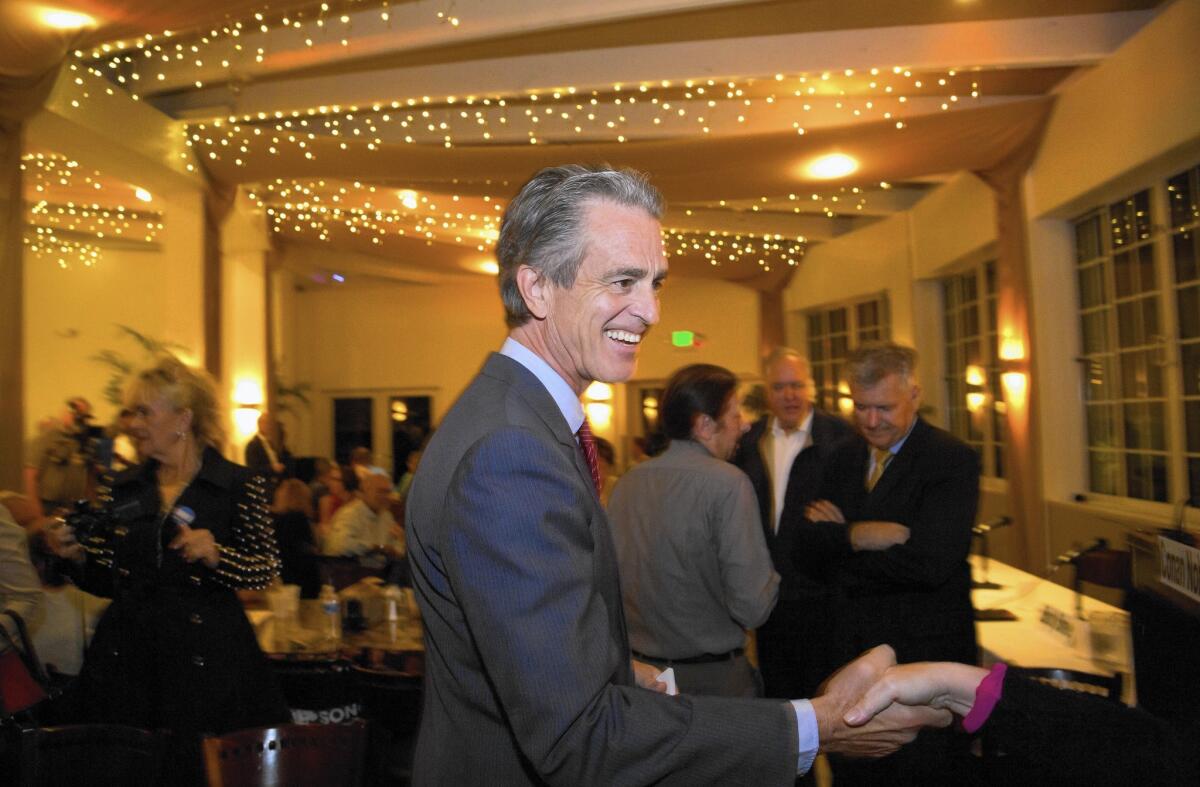Kuehl, Shriver each made their mark

For Bobby Shriver, homelessness has always been an issue close to his heart. He made it a central focus during his years on the Santa Monica City Council.
But his dogged campaign alienated some would-be allies and, former colleagues say, ultimately made it more difficult to achieve his signature goal of creating housing for homeless veterans.
Sheila Kuehl spent years in the Legislature fighting for those who needed help. She pushed for pioneering laws protecting gays and lesbians, women and families.
But she also supported increasing benefits for state public employees 14 years ago, an action that critics say helped bring on billions of dollars of pension debt now challenging the state and local governments.
As Shriver and Kuehl compete to succeed Los Angeles County Supervisor Zev Yaroslavsky, Shriver’s advocacy for homeless aid and Kuehl’s support for larger state pensions have received attention.
Far from shying away from the issues, the candidates are quick to defend their work as part of what makes them effective leaders. Each offers a window into how they might approach government if elected to the board, where the winner is expected to be a pivotal swing vote on many issues.
“Kuehl would argue that she worked well with others,” said Raphael Sonenshein, chief of the Edmund G. “Pat” Brown Institute for Public Affairs at Cal State L.A., “that she was able to build consensus around legislation, even when it was pioneering and difficult to obtain.
“And Shriver would argue his ability to elevate issues into the public arena and move them forward in a cutting-edge way is his mark.”
During six years in the state Assembly and eight in the state Senate, Kuehl wrote laws that lowered nurse-to-patient ratios and added civil rights protections for lesbian, bisexual, gay and transgender groups and battered women. She delved into the arcane world of water law and created the state’s first paid family leave program.
Former Democratic state Sen. Gloria Romero, who served with Kuehl in the Senate, said her witty colleague managed to win people over, even if they weren’t at first convinced. This was especially true of some of her early gay-rights legislation that had a tough go, even among some Democratic colleagues, Romero said.
“She talked to people. She didn’t try to mow them over,’’ she said. “She wanted them to understand the policy behind the bill.”
Also while in Sacramento, where partisanship reigns, Kuehl joined her Democratic colleagues in voting for a 1999 pension boost for California Highway Patrol officers. That law is often cited by critics as a pivotal precedent that unleashed a statewide rush by public employee unions in cities and counties for better retirement packages.
Under the law, CHP officers received retroactive pension increases of up to 50%, making them eligible for up to 90% of their working pay in retirement. Legislation that followed increased retirement pay for civilian workers in state government and made a variety of pension boosts optional for localities.
In the decade that followed, law enforcement and other workers in one jurisdiction after another saw the CHP’s gain as a bargaining baseline to at least be matched, if not exceeded.
Today, hundreds of California municipalities are struggling to cope with steeply higher pension expenses. Three — Vallejo, Stockton and San Bernardino — have gone bankrupt, citing in part higher pension costs.
Kuehl was on the Assembly Appropriations Committee that moved the CHP bill to a floor vote, where it passed overwhelmingly with votes from both parties. It was later signed by Gov. Gray Davis.
Romero, who sat with Kuehl on the Appropriations Committee and has endorsed her, said the bill was heavily backed by labor and had been sold as a cost-free enhancement that would be paid out of surpluses that then existed in the state’s CalPERS pension trust. “In retrospect, it was a mistake,” Romero said.
Kuehl is unapologetic, saying that her vote was appropriate at the time. Highway Patrol officers testified about the high stress of their jobs, she said, and it was the first pension increase in 50 years.
“Firefighters and law enforcement [officers] are much more short-lived in their work than us,’’ Kuehl said. “They can’t go for 30, 40 years. It seemed reasonable at the time.”
Shriver points to the law, saying voters should be concerned that Kuehl didn’t grasp the potential long-term consequences of her vote. “Please explain why giving my kids that liability was appropriate,’’ Shriver said.
During his two City Council terms ending in 2012, Shriver voted to help clean up Santa Monica Bay. He joined other members in cutting red tape for small businesses and calling for more affordable housing as rents spiraled in the coastal city.
After Gov. Arnold Schwarzenegger put him on the California State Park and Recreation Commission, Shriver, a sibling of former California First Lady Maria Shriver, opposed his then-brother-in-law by voting against a favored toll road through San Onofre State Beach in San Diego County.
Those who worked with him, and Shriver himself, say that his passion was getting the homeless off the streets and into housing. Former Democratic Assembly Speaker Robert Hertzberg says Shriver’s efforts on the homeless persuaded him to support the candidate, calling him “inquisitive and energetic.”
Shriver pushed Santa Monica to hire former longtime Westside county Supervisor Ed Edelman as the city’s homeless czar to bring attention to the issue. They persuaded faith groups who had been feeding homeless people in city parks to bring their programs indoors — where those living on the streets could be better connected with needed housing and social services, Shriver says.
He pushed his fellow council members to discuss homelessness early during their weekly meetings so the public watching on TV or listening on the radio would hear about the issue, and programs and strategies for addressing it, before they tuned out. The city’s efforts have paid off, officials say, citing a 20% reduction in people living on the streets. They add that the numbers didn’t rise again during the Great Recession.
Shriver’s most relentless campaign was to convert three empty buildings on the Veterans Administration campus in Westwood into housing for homeless veterans. He assailed the federal government for not moving faster and, in 2012, openly criticized Democratic Rep. Henry Waxman’s efforts on the issue. An irked Waxman countered that he was doing everything he could. The retiring congressman recently endorsed Kuehl.
The Westwood housing initiative turned into a years-long battle that included a federal class-action lawsuit on behalf of veterans filed by the ACLU and supported by Shriver. Thus far, only one of the buildings is being converted and is expected to house about 65 veterans next year. If the remaining two are converted as Shriver proposed, the project would house a total of 200 homeless veterans. When that may occur is far from certain.
Santa Monica Councilwoman Gleam Davis, who is supporting Kuehl, said her former colleague deserves credit for “changing the conversation” on homelessness. His crusade to house veterans on the VA property was less effective, she added.
Yaroslavsky, who hasn’t endorsed a possible successor in the race, has characterized the results of Shriver’s effort as a “drop in the bucket” for the estimated 6,700 veterans who need housing. “A lot of time and energy was spent on something that is going to address the needs of 170 to 200 homeless vets,” he said in a Times interview earlier this year.
Shriver says that he intends to expand his policymaking vision if he is elected supervisor. But he also makes it clear, in numerous interviews and public events, that creating more housing for homeless veterans remains near the top of his agenda.
“That one took me longer, for sure,’’ he said earlier this year of his fight to convert the first Veterans Administration building. “Quite rightly — I was a part-time councilman.
“But when I’m the supervisor and that is my unincorporated area, how long do you think it will be before there’ll be vets sleeping there?”
catherine.saillant@latimes.com
Follow @csaillant2 for more news about the supervisor’s race.
More to Read
Sign up for Essential California
The most important California stories and recommendations in your inbox every morning.
You may occasionally receive promotional content from the Los Angeles Times.











